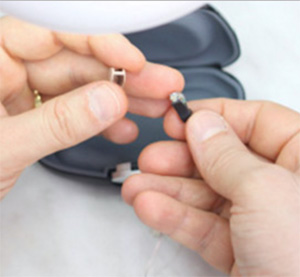Hearing aids are very small, finely-tuned devices that require daily attention to work correctly. There are several tools that can be used to help clean and care for your hearing aids, including a battery tester, forced air blower, listening tube and drying container. Ask your audiologist for tips on how to care for your specific models.
Check the Batteries
You can use a battery tester to ensure the batteries in your device are working to the fullest potential. Expect to replace your batteries every 1-2 weeks. Carrying spare batteries wherever you go will ensure you are never caught off-guard when your batteries fail. Take care in how you dispose of your batteries; they are toxic, and require proper disposal.
Prevent Excess Moisture
Your device can come into contact with moisture as you wear them, so a drying container is a great way to prevent moisture build-up in your hearing aids. This can lengthen the life of your hearing devices, so it’s a great way to protect your investment! Always remove the batteries before placing them in the storage or drying containers.
Do Listening Checks
A listening tube allows you to listen to your device to ensure the sound is clear and not scratchy or weak. Listening every day will help you to detect any issues early. Ask your audiologist to show you how to perform these daily checks so you can get the most out of your hearing aids.
Prevent Feedback
One complaint from hearing aids is sometimes feedback: the whistling sound that occurs when sound re-enters the microphone from the outside of the earmold. Feedback is unwanted and unnecessary, and can interfere with you hearing clearly. It can be caused by and improper earmold fit or an excess of ear was in the ear canal. Let your audiologist know if you are experiencing feedback so they can help you to avoid it.
Clean Your Device Regularly
You can remove the earmold from your hearing aid and clean both parts with a soft, dry cloth, then allow it to dry out before rejoining the parts. Check each piece for visible dirt and clean them well. Your audiologist may also provide a special tool for cleaning your hearing device.
It is important to make regular visits to your audiologists so they can check and adjust the performance of your hearing aids, and make them as functional and useful as possible for you.
Here is some troubleshooting advice if you are experiencing trouble with your hearing aid:
If there is no sound…
- Check that it is turned on
- Check that it is turned up
- Check the battery—is it inserted correctly, and is it working?
- Is the tubing connected properly, not bent or twisted?
- Are the vent openings or receiver opening blocked?
- Is the microphone opening blocked? (It can be cleaned with the brush in your tool kit)
If the sound is intermittent or distorted…
- See if there is moisture in the tubing. If so, use the air blower to dry it out.
- Check for cracks or holes in the tubing. If you see any, ask your audiologist for help.
- Replace the battery
- Check for any cracks or problems with the cords between the hearing aid parts.
If you hear feedback (whistling)…
- Try turning the volume down.
- Ensure the earmold is securely placed in your ear.
- Check that the microphone is not obstructed by any object (scarf, collar, hat).
- Have your doctor check for excessive wax build up in your ear canal.
To replace your battery…
- The removable tab on the battery should be detached first.
- Ensure the battery is inserted correctly with the “+” side up.
- Whenever you aren’t using your hearing aid, open the battery door to air out.
- The batteries should be stored in a dry, cool place (not the refrigerator).
- Do not swallow any batteries.
- Batteries should be stored away from pets and children.
- Batteries should be stored away from medications.
If a battery is swallowed, call the National Battery Ingestion Hotline: 202-625-3333.
Join our Listen Up Café, Friday, June 16th 10-12pm
Come and discover how to get the most from your investment through proper cleaning and troubleshooting common issues. We’re here to help!
RSVP (408) 354-1312 for this Important Community Seminar and enjoy great coffee and goodies!
Los Gatos Audiology 15899 Los Gatos-Almaden Rd., Suite 8 Los Gatos, CA 95032
For an appointment please call (408) 354-1312 or visit www.losgatosaudiology.com.


